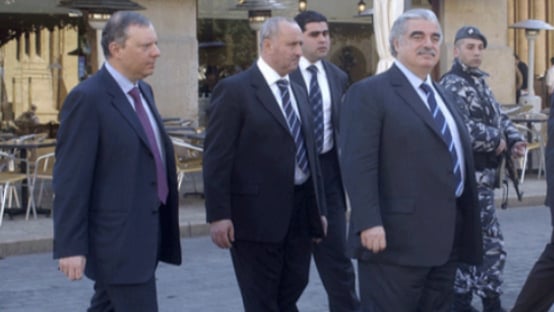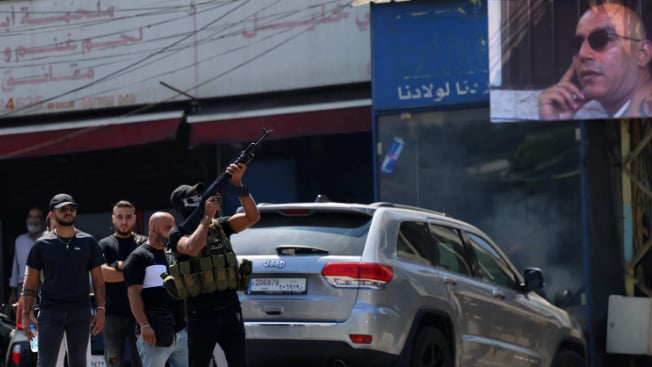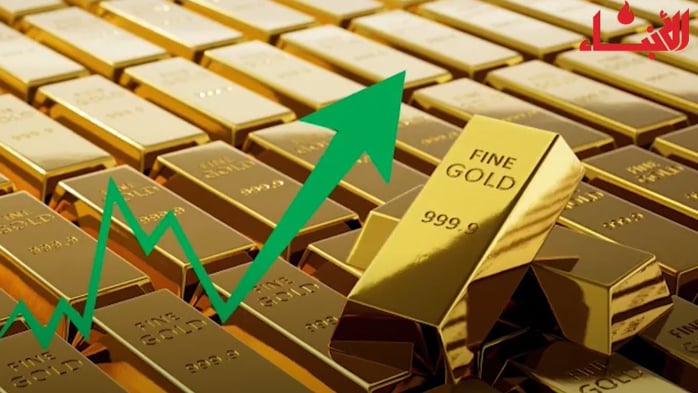Former warlord Walid Jumblatt is exactly the kind of political figure Lebanese protesters are hoping to oust, but he says he hopes to see the protesters succeed.
During Lebanon's civil war Mr Jumblatt was the leader of the People's Liberation Army, a powerful militia made up of the country's Druze religious minority.
"I am no angel," he told the ABC's PM program. "But I am at the end of my political life. I have to give a message of hope to a new generation."
Like many former militia leaders, Mr Jumblatt entered politics after the war, becoming a powerbroker in Lebanon's Parliament, which is divided along religious lines in a power-sharing deal that brought an end to the civil war.
Now, a mass protest movement is challenging Mr Jumblatt's generation of political leaders, accusing them of corruption and using the sectarian constitution to keep a firm grip on power for themselves.
"I've been in politics for 40 years. This is the first time in the history of Lebanon there is such an upheaval away from sectarianism, from the north to the south [of the country]" he said.
The Druze leader, who once fought against Christian adversaries alongside his allies the Palestinian Liberation Organisation, said the movement against sectarianism gave him hope.
"I am optimistic, but it is going to take a long time," he said.
Protestors aim to oust Government
Lebanon's economic woes have fuelled the mass protests sweeping Lebanon. The country has the third biggest debt in the world, unemployment has reached 25 per cent and banks, which closed for a week but reopened, are still worried about a run on deposits.
In the past, funding has come from Saudi Arabia and overseas remittances, but both have slowed to a trickle, and promises of international financial assistance is dependent on reforms the Government has failed to implement.
"We are on the verge of economic collapse," Mr Jumblatt said. "We need efficient and honest technocrats who will serve on specific key ministries, like finance and economy and other things."
A key demand from protesters has been the resignation of the Government and replacing it with an interim government of expert technocrats without political affiliations.
Mr Jumblatt rejected the idea of removing politicians from government wholesale, but encouraged a new generation of political leadership to emerge from the political crisis in Lebanon.
"It's up to the new class that will govern Lebanon, the new people's government, to implement a policy away from neoliberalism, which has ruined us," he said.
Despite his zeal for reform, Mr Jumblatt's Progressive Socialist Party remains part of the Government, which protesters are trying to oust. His party maintains two Ministers in the coalition Government.
Protesters have included Mr Jumblatt's name in chants of the leaders they want to see leave the political process.
Hezbollah's role
As the political crisis has deepened, many are watching Hezbollah to see how one of the most militarily and politically powerful forces in the country will react to the popular uprising.
In the past, Mr Jumblatt has forged shaky alliances with Hezbollah while at other times his Druze forces have ended up in shootouts with the Shia militant group.
"[Hezbollah is] supported by a great proportion of Lebanese citizens," he said.
The support Hezbollah still enjoys among its base should not entitle Hezbollah, according to Mr Jumblatt, to ignore the concerns of protesters or turn against them.
"The revolt is across sectarian lines," he warned.
Old guard still clinging to power
Lebanon's protest movement claimed its first major victory when it forced prime minister Saad Hariri to resign. But only a week later, there are reports Mr Hariri could return to the political scene.
A change of agenda would be required, according to Mr Jumblatt, if the former PM had any chance of returning.
"He has to change his policy of neoliberalism which has ruined the country," he said. "Two, I hope he will apply the demands of the revolution of the people."
Asked if he, as a member of the political elite that has ruled the country since the civil war, was personally culpable for the crisis in Lebanon, Mr Jumblatt said: "Of course."
I came to my position at the beginning of the civil war and I had to defend my own people," he said. "But at the end of my political career I'm saying there is a need for change."
"The people on the ground are saying much more than me."





